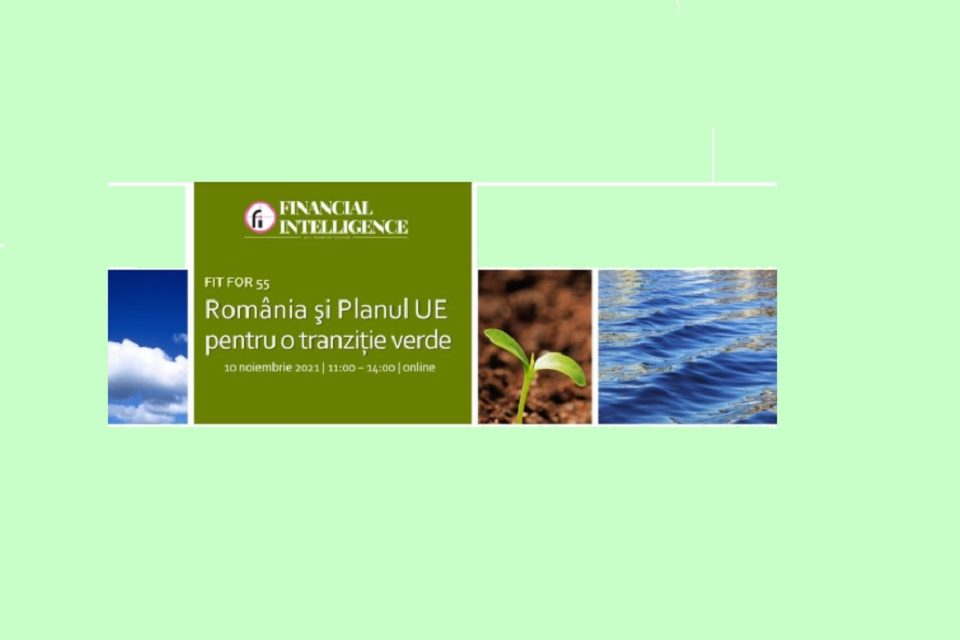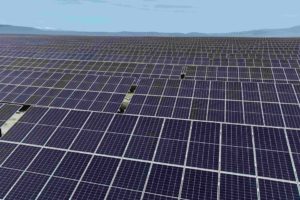Statements of Fit for 55 conference: Romania and the EU plan for a green transition

The Fit for 55 EU package is a set of proposals to revise and update EU legislation and to put in place new initiatives with the aim of ensuring that EU policies are in line with the climate goals agreed by the Council and the European Parliament. The package of proposals aims at providing a coherent and balanced framework for reaching the EU’s climate objectives, which: is fair and socially just; maintains and strengthens innovation and competitiveness of EU industry while ensuring a level playing field vis-à-vis third country economic operators; underpins the EU’s position as leading the way in the global fight against climate change. The Commission presented the package on 14 July 2021.
In this context, read below the main statements that have been uttered within the recently held “Fit for 55: Romania and the EU plan for a green transition” conference organized by Financial Intelligence.
Radu DUDĂU, Energy Policy Group: “The unprecedented European funds available now must be treated as an opportunity; Romania must make intelligent use of its resources”
The unprecedented European funds available must be treated as an opportunity, and Romania must intelligently capitalize on its resources, said Radu DUDĂU, Co-Founder and CEO, Energy Policy Group, at the Debate “Fit for 55: Romania and the EU Plan for a green tanziţie ”organized by Financial Intelligence, Wednesday, November 10, 2021.
Fit for 55 is a proposal for directives and regulations that will be negotiated by 2023, said Radu Dudău: “There is nothing mandatory now. It is very appropriate for the parliamentarians to have informed positions, to consult at interparty level ”.
Read more on the statement:
Radu DUDĂU said that Romania can benefit from the necessary funds, if the Government does what it has to do: “In the energy area, I note with dismay that an essential instrument of the European Ecological Pact, called the Modernization Fund, which currently , for the 2030s, for Romania alone, provides more than 10 billion euros, does not have, even at this time, a year late, the implementation guide. We are the only beneficiary state that does not have any rules ready, at this time, about how the projects will be submitted, what are the allocation principles, possible support schemes. The Fair Transition Fund also has long delays.
We have been facing this phenomenon of a lack of administrative capacity, especially in the government area, for years. The parliamentarians mentioned this aspect and said that they would like to see quantitative, numerical substantiations, coming from the Government. “
If we do not find a solution to this problem, we will not be able to attract the money, Dudău also said: “It is also the fault of the patronage and clientelism system of the big parties, which simply treats the Government, key institutions, as places politicians. It has reached the point where, at the moment, the Government has collapsed because it has trembled in front of the huge amount of money that stands in their way and the parties are thinking about who will manage this amount of money. We must overcome this paradigm. We have to think differently. We need to see what the national interest is and, secondly, bring in the government decision-making structures and the development of plans and strategies competent people, including finding the way to competitive remuneration (…) Unprecedented funds are available. It is a moment that must be treated as a chance. The risks must be weighed quantified and Romania must intelligently capitalize on its resources ”.
He recalled that there is already the European Regulation 1119 of 2021, which means, in fact, the European climate law: “There is already a European regulation with targets set for 2030 and 2050. These are not an optional issue.
We should now have a national strategy for a controlled exit from the coal sector. Otherwise, the market itself will do it in a more painful way. Instead, politicians prefer to make promises that are often not sincere. Because, in private, they know that they will not be able to invest in these industries beyond 2030. It’s a moment of honesty. “
Radu Dudău says that the Black Sea gas project is of national importance: Black Sea”.
Cătălin NIȚĂ, FPPG: “We need to do something to develop the Black Sea gas stock; We have political consensus; It is time to take concrete steps to update offshore legislation”
It is time to take concrete steps to update the offshore legislation necessary for the development of Black Sea gas, said Cătălin NIȚĂ, Executive Director, Federation of Petroleum and Gas Employers (FPPG), at the Debate “Fit for 55: Romania and the EU Plan for a tanzizi green ”organized by Financial Intelligence, on November 10th, 2021. He noted from the discussions at the event, which was attended by officials from Parliament, Government and the European Parliament, that there is political consensus.
Read more on the statement:
“Black Sea resources are an example of an investment opportunity in Romania, said Cătălin NIȚĂ: “All over the world, there is fierce competition in terms of attracting capital and investors. We are happy to have investors already in the country who have their own resources. The state does not have to do anything to generate investments, it does not have to co-finance them. We also have human resources. The gas industry, with a history of over 110 years of exploration and development in Romania and over 50 years of history in the Black Sea, in particular, still benefits from the experience and expertise of tens of thousands of people. They are well qualified, well paid and well appreciated globally. This workforce is migrating, because this is typical of the industry, globally. By facilitating the investment from the Black Sea we can have an extra human resources. I am referring to a figure of 30,000 new jobs that can be created.
The figure is calculated in a Deloitte study from a few years ago. In addition to new jobs, we secure existing ones. We can bring back the Romanians who went abroad for other projects. (…) According to the same study, $ 26 billion in industry-wide investments over the 22 years considered in that study are discussed. An amount almost as large as the much discussed PNRR. All this investment brings to the state budget around RON 9 billion annually. It would be a great pity to miss this opportunity. I am pleasantly impressed by what was discussed at today’s conference and I am very optimistic, because all representatives, whether from ministries or the European Parliament or the Romanian Parliament – both chambers, spoke in the same vein: Gas is clearly a transition fuel. We all agreed that we need to do something to develop the Black Sea gas, we all agreed that there is a desire and opportunity to amend the Offshore Law, which is an impediment to implementing an already written plan and which must be only slightly updated compared to the level of 2018 when this law was voted in its current form. Unfortunately, after three years, we find that this law has not benefited investors, nor the Romanian state, unfortunately, nor Romanians, who today are worried about energy security and if we have enough gas to spend the winter. ”
The 21st century is announced to be the century of green energy, but we will get there after a period of transition, said Cătălin Niță: “Renewable energies are very good and have little impact on the environment, but we must keep in mind that they must be balanced in the system . It seems that, technologically, gas is, among all the other alternatives, the ideal solution that can be implemented very quickly. A gas-fired power plant starts almost instantly. (…) So we can eliminate coal, because it is the blackest of all energy sources, by replacing it with natural gas. ”
Modernizing or updating offshore legislation to what is happening in the world is more than necessary, the FPPG official added.”
Other statements of Fit for 55 conference:
Cristian BUȘOI: “On taxonomy, the discussions are very complicated, but I am a supporter of gas for the transition period.”
Energy price increases are not mainly caused by the Green Deal or Fit for 55, it is a completely broader context from an international point of view, as well as certain games from the East, from Gazprom, and the increased demand in Asia, said Cristian BUȘOI, Chairman of the Committee on Industry, Research and Energy, European Parliament, at the Debate “Fit for 55: Romania and the EU Plan for a Green Tension”, organized by Financial Intelligence on Wednesday, November 10, 2021. He continued: “Sure that both Green Deal and Fit for 55 had an influence by decreasing gas production within the European Union, because they give wrong and confusing messages regarding gas and then companies no longer invest, no longer explore. Another reason is the increase in CO2 certificates, which have obviously led to some increases. But not even this increase in energy prices has seen the decision to go in the direction of the Green Deal diminish, and more recently, neither COP 26. Of course, COP 26 has brought some good news, but clearly through the non-participation of important players. we cannot say that it is a success. It is clear to all of us that, only through the efforts of the European Union, we cannot change the situation on a global scale. I am afraid that we will make some sustained efforts and we will not change the general situation, but we can endanger the competitiveness of European industry ”.
Iuliu Winkler: “Everything that involves the double transition – green and digital – is the biggest change in the history of the European Union”
The issue of the equitable transition to a green and digital economy is important for all, not just those who are vulnerable from an energy or social point of view, said Iuliu WINKLER MEP (UDMR, EPP), First Vice-President of SME Europe, at The debate “Fit for 55: Romania and the EU Plan for a green transition” organized by Financial Intelligence, Wednesday, November 10, 2021.
“In order to make a fair transition at home, I think it is mandatory to achieve, in a short time, quite many goals, but I consider that six are the most stringent. We have to do three at home and three in Brussels “, said the MEP.
Firstly, it is important to be aware that the green transition, as set out in the Green Pact, which will be implemented through the measures set out in the Fit for 55 legislative package – Ready for 55, is, together with the digital transition , the European Union’s solution for overcoming the crisis, for economic recovery, said Iuliu Winkler: “At the same time, it is the step to make a huge paradigm shift and enter the 21st century. I believe that everything involves this double transition, green and digital, is the biggest change in the history of the European Union, an even bigger change than the introduction of the euro. I believe that we are facing a greater transformation than those resulting from the successive EU treaties that have always gone incrementally. We know that the EU is developing incrementally. We take a step that we absorb, then we take another. I had an enlargement, I assimilated it, then I did another enlargement. This time, the European Commission is coming and proposing a total change for us, both economically and socially. This also implies a change of mentality. “
László BORBÉLY, on the Black Sea gas: “We have not been able, for 8 years, to find a clear solution for the investors who will bring here 6-7 billion dollars; I hope to give it a go soon, because otherwise we’ll lag behind”
We have failed, for 8 years, to give a clear solution to investors who will bring, by exploiting the Black Sea gas, investments of 6-7 billion dollars; I hope to give it a go soon, because otherwise we will stand in line, said László BORBÉLY, State Councilor, Coordinator of the Department for Sustainable Development, Government of Romania, at the Debate “Fit for 55: Romania and the EU Plan for a green tansy ”organized by Financial Intelligence on Wednesday, November 10, 2021.
László BORBÉLY said: “We have to formulate a point of view in the national interest of Romania, regarding Fit for 55, which is a very complex issue. There are currently twelve legislative proposals in the European Union. This project must be analyzed from a technical, political and inter-institutional point of view in terms of our desires to emerge victorious, ie to have a green economy, but not with costs that we can not cover later.
We are for this decarbonization, for a green future, but we have to see what Romania’s possibilities are. We have a country rich in resources, we have the Black Sea gas that we have been talking about since 2012, but we have not all managed, for 8 years, to give a clear solution to investors who come with an investment of six to seven billion dollars and let’s put our decision on the table. I have changed this offshore law many times and I hope we will give this answer soon, because otherwise we will stand in line – it is Turkey, there are other countries facing us.
Ştefan-Radu OPREA: “Most of small and medium enterprises in Romania are not prepared to go greener; Romania could use its resources intelligently to its advantage”
The vast majority of small and medium-sized enterprises in Romania are not prepared to be greener, said Ştefan-Radu OPREA, Member of the Economic, Industries and Services Commission of the Senate, at the Debate “Fit for 55: Romania and the EU Plan for a green transition ”organized by Financial Intelligence.
Ştefan-Radu OPREA added: “On November 10, in the Senate, the Fit for 55 package was debated in the Committee on European Affairs, which includes directives and regulations (Communication from the Commission to the European Parliament, Council, Committee European Economic and Social Committee and the Committee of the Regions – “Ready for 55”: meeting the EU’s 2030 climate target on the road to climate neutrality).
When we talk about regulations, the intervention of the Senate – which is the first chamber that always decides on European affairs – is important, then follows the opinion of the Chamber of Deputies. If we had an opinion against this package, we should have already expressed ourselves, because the eight weeks in which we could give a reasoned opinion have passed, which means that we are against it. We should probably express opinions at this time on the proposals for a directive and on the regulation, because, especially in the case of regulations, this is the time.”















